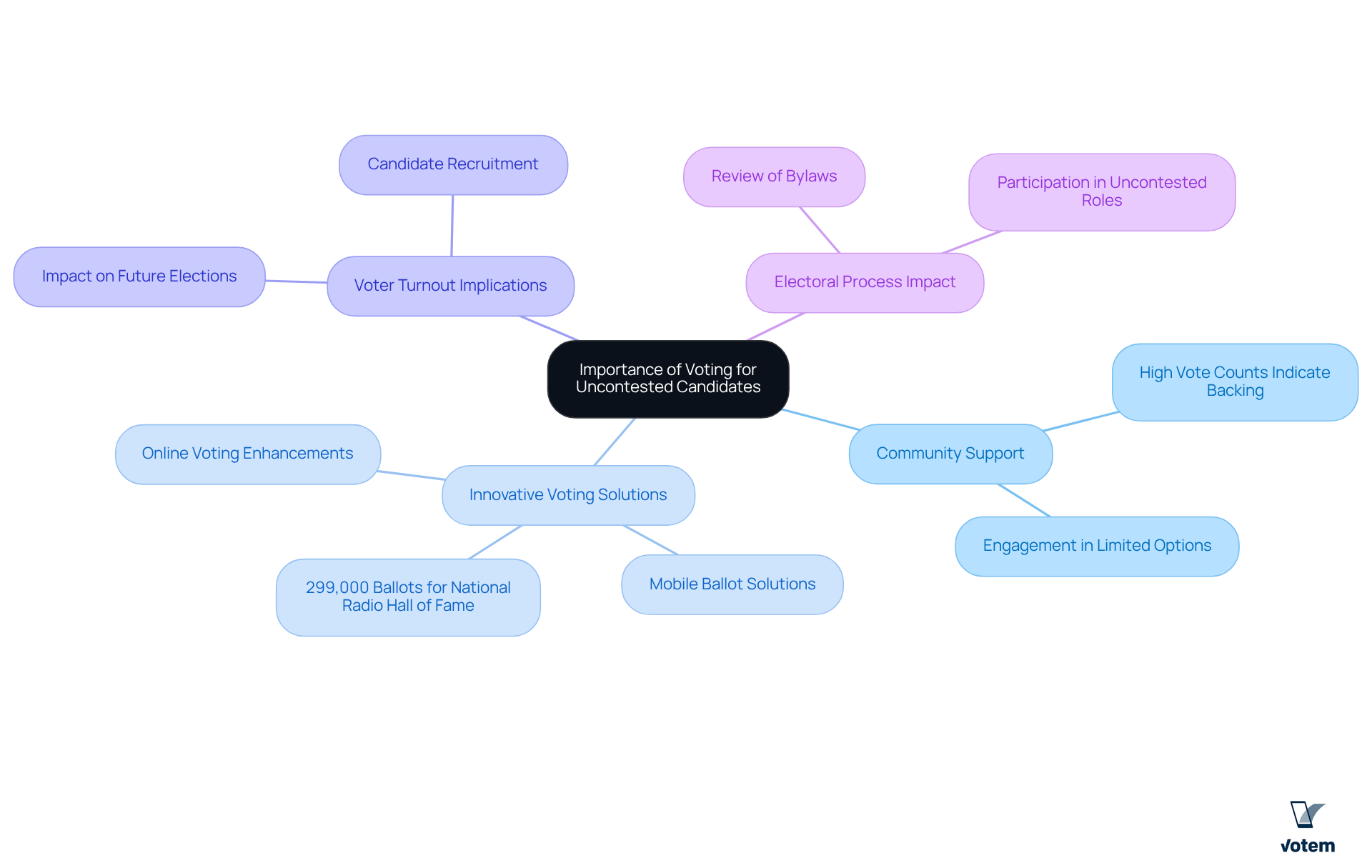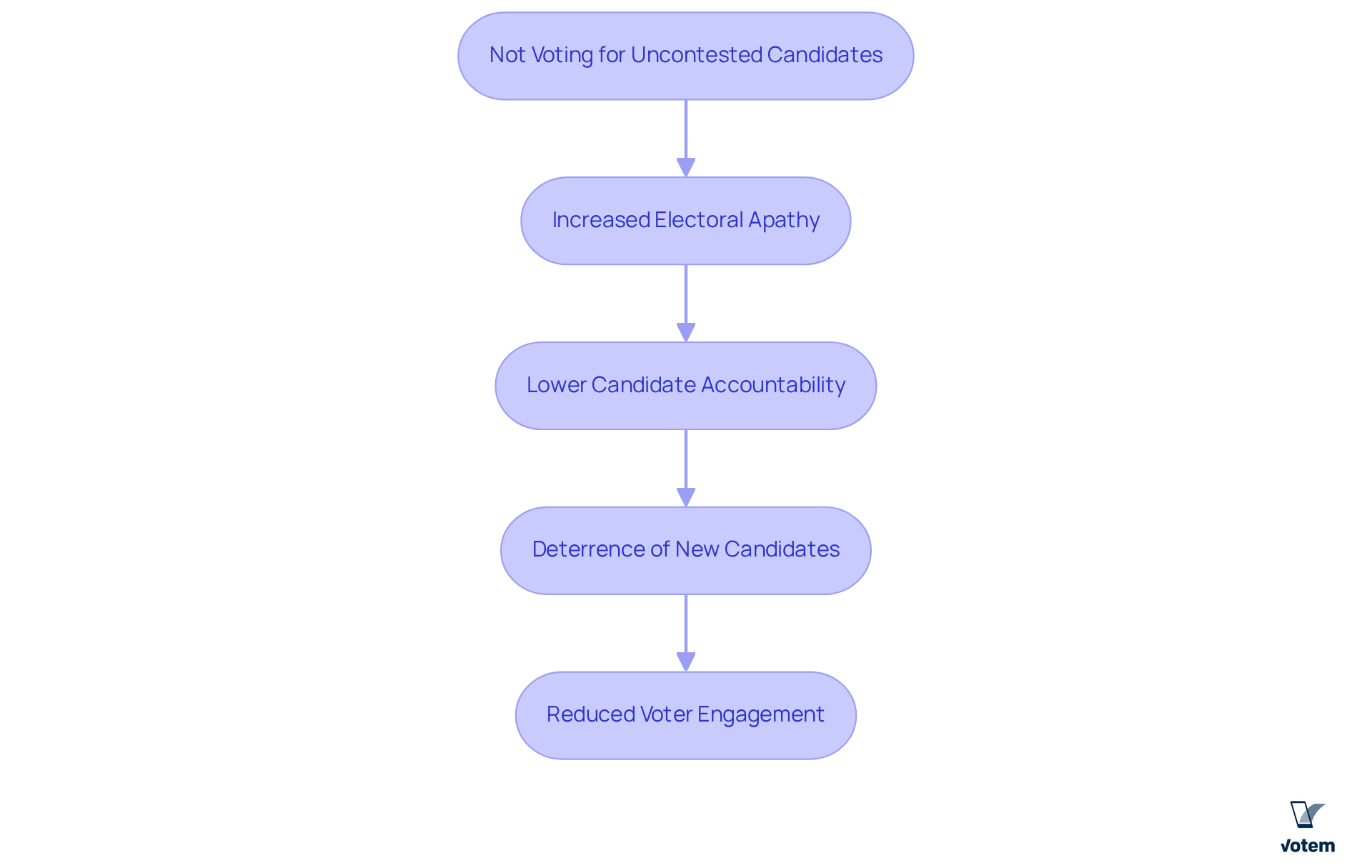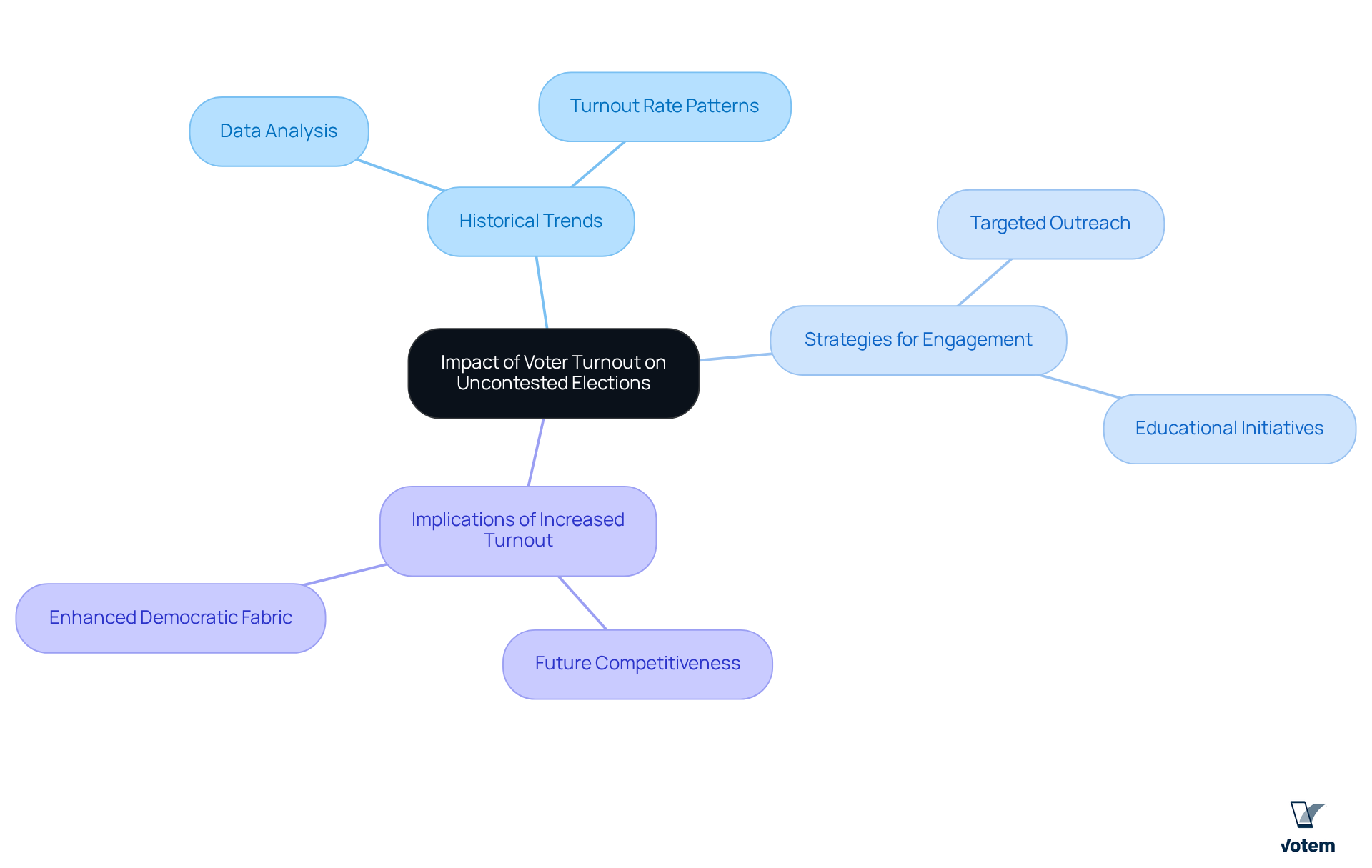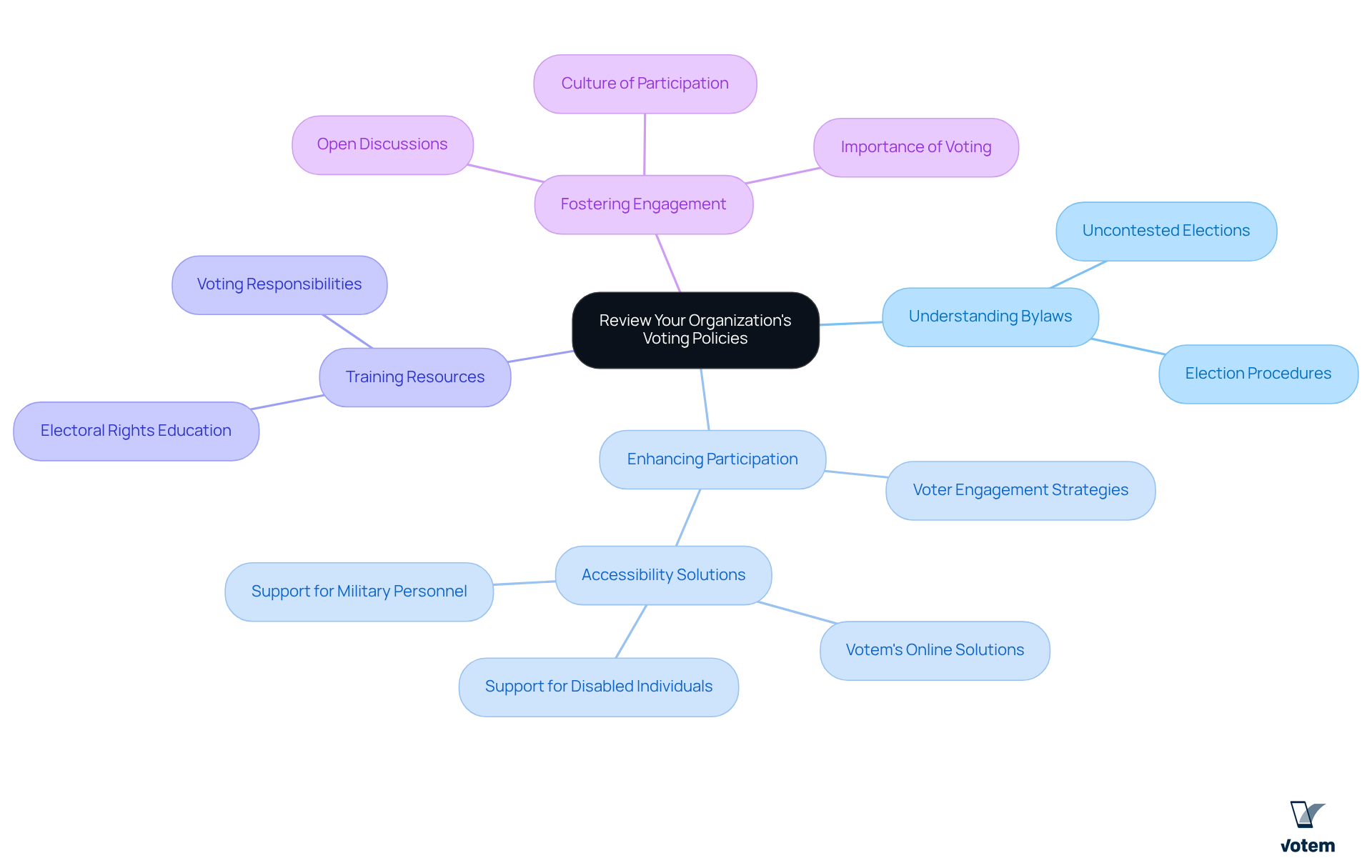Overview
Voting for unopposed candidates, while not mandatory, plays a crucial role in affirming their legitimacy and reflecting community support. This support can significantly influence future electoral engagement. High participation rates for uncontested positions signal strong backing from the community, which is essential in combating electoral apathy. By encouraging such participation, we foster a more vibrant democratic process that benefits all stakeholders involved.
Introduction
Voting is often regarded as a cornerstone of democracy; however, the nuances of participating in elections with unopposed candidates raise critical questions about civic engagement. While it may appear straightforward to abstain from voting when there are no contenders, casting a ballot for these candidates can profoundly influence community representation and future electoral dynamics.
What are the implications of choosing not to participate in such votes, and how does this decision reverberate through the democratic process? Exploring these considerations reveals the essential role that every vote plays, even in uncontested races, highlighting the need for active participation in shaping our democratic landscape.
Assess the Importance of Voting for Uncontested Candidates
Acknowledging the significance of whether you have to vote for unopposed candidates in elections is essential. Such participation can affirm their legitimacy and support within the community. High vote counts for unopposed candidates often indicate strong community backing, showcasing the effectiveness of innovative online voting solutions that enhance accessibility and security. For instance, the organization adeptly managed the receipt of 299,000 ballots for the National Radio Hall of Fame, demonstrating a notable rise in participation. This illustrates how these systems can promote increased engagement, even in elections with limited options.
Furthermore, considering the implications of voter turnout on future elections and candidate recruitment is crucial. Votem’s commitment to improving electoral accessibility, particularly through , has proven vital in boosting involvement, especially during challenging periods like the Covid-19 pandemic. Organizations should examine their bylaws to determine if ballots are necessary for uncontested roles, particularly to clarify do you have to vote for unopposed candidates, as participation can significantly impact the electoral process. Reflecting on the importance of involvement in elections, even when options are limited, can foster a more engaged and supportive community.

Evaluate the Consequences of Not Voting for Uncontested Candidates
Abstaining from participation can significantly enhance electoral apathy and disengagement in upcoming elections, raising the question of whether you do have to vote for unopposed candidates. When citizens perceive their involvement as inconsequential, it often leads to a cycle of low participation, causing candidates to feel less accountable to their constituents. This absence of accountability can deter new candidates from entering the race, as they may sense a lack of interest or support from the community.
The company’s innovative online ballot solutions have proven to improve accessibility and security, as evidenced by testimonials from satisfied clients. For instance, the adoption of contemporary systems has facilitated enhanced access for all eligible participants, including military personnel and individuals with disabilities, which is vital for fostering a culture of voting. The New Mexico State Republican Party has expressed satisfaction with Votem’s software, indicating a commitment to utilizing these services again. This demonstrates a positive trend towards heightened voter engagement.
Moreover, low participation rates can dissuade potential candidates from running, as they may question their chances of success in a disengaged electorate. The impact of your vote—or lack thereof—on the overall democratic process and community representation cannot be overstated. Engaging in discussions with colleagues about the significance of maintaining a culture of electoral participation raises the question, do you have to vote for unopposed candidates, even in uncontested contests? Votem’s solutions not only but also promote a more active and engaged electorate, ultimately fortifying democracy.

Understand the Impact of Voter Turnout on Uncontested Elections
Examine the influence of participation rates on the perception of uncontested elections within your organization. Historical data on turnout rates in uncontested elections reveals significant trends that warrant attention. In order to boost participation in elections, it’s important to address whether you have to vote for unopposed candidates and consider implementing targeted outreach and educational initiatives. These strategies not only encourage citizens to engage but also foster a deeper understanding of the electoral process. Ultimately, can pave the way for more competitive elections in the future, enhancing the democratic fabric of your organization.

Review Your Organization’s Voting Policies
Familiarize yourself with your organization’s bylaws concerning uncontested elections; understanding these rules is essential for effective participation. It is crucial that all members are informed about the election procedure and its significance, particularly in light of Votem’s groundbreaking online solutions that enhance accessibility for all participants, including individuals with disabilities and military personnel. Furthermore, discuss any necessary updates to policies that could improve voter engagement, drawing inspiration from successful implementations that have significantly boosted voter turnout.
Offer training or resources to assist members in comprehending their electoral rights and responsibilities. It is important to , even when considering do you have to vote for unopposed candidates. Encourage open discussions about the value of voting, as Votem’s solutions have demonstrated that every vote counts, contributing to a more inclusive electoral process. In addition, consider how these discussions can foster a culture of engagement within your organization.

Conclusion
Participating in elections, even when faced with unopposed candidates, carries significant weight in affirming democratic values and fostering community engagement. Voting for these candidates not only legitimizes their positions but also reflects the collective support of the electorate. Each ballot cast contributes to a culture of participation that can influence future elections and candidate recruitment.
The article highlights several key arguments underscoring the importance of voting in uncontested elections. It emphasizes how high participation rates can:
- Bolster accountability among candidates
- Encourage new entrants into the political arena
- Enhance the overall health of the democratic process
Furthermore, innovative online voting solutions have been shown to improve accessibility, thereby increasing voter engagement, especially among marginalized groups.
Ultimately, the significance of voting for unopposed candidates transcends the immediate election cycle. It fosters a more engaged community and reinforces the democratic framework within organizations. Encouraging discussions about the importance of every vote can inspire a culture of participation, ensuring that even uncontested elections are viewed as vital to the electoral process. Engaging in this discourse is essential for nurturing a vibrant democracy where every voice matters.
Frequently Asked Questions
Why is voting for uncontested candidates important?
Voting for uncontested candidates is important as it affirms their legitimacy and demonstrates community support. High vote counts indicate strong backing, showcasing the effectiveness of voting solutions that enhance accessibility and security.
How can online voting solutions impact participation?
Innovative online voting solutions can increase participation by making the voting process more accessible and secure. For example, the National Radio Hall of Fame successfully received 299,000 ballots, indicating a notable rise in engagement.
What implications does voter turnout have for future elections?
Voter turnout can significantly impact future elections and candidate recruitment. It reflects community engagement and can influence how organizations approach electoral processes.
How has Votem contributed to electoral accessibility?
Votem has improved electoral accessibility through mobile ballot solutions, which have been particularly vital in boosting participation during challenging times, such as the Covid-19 pandemic.
Should organizations consider ballots for uncontested roles?
Yes, organizations should examine their bylaws to determine if ballots are necessary for uncontested roles, as participation in these elections can significantly influence the electoral process and community engagement.
What is the overall message regarding participation in elections with limited options?
The overall message is that involvement in elections, even when options are limited, is crucial for fostering a more engaged and supportive community.

